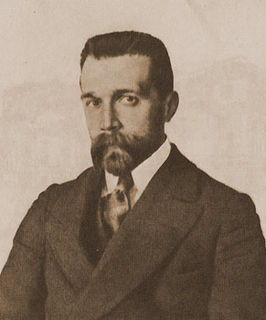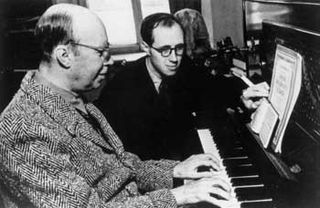
Edison Vasilievich Denisov was a Russian composer in the so-called "Underground"—"Anti-Collectivist", "alternative" or "nonconformist" division of Soviet music.
Sergei Prokofiev's Symphony-Concerto in E minor, Op. 125 is a large-scale work for cello and orchestra. Prokofiev dedicated it to Mstislav Rostropovich, who premiered it on February 18, 1952 with Sviatoslav Richter conducting. After this first performance, it was revised and given its current title. It is itself a revised version of his earlier Cello Concerto, Op. 58, written in 1933–8.

Nikolai Yakovlevich Myaskovsky or Miaskovsky or Miaskowsky (Russian: Никола́й Я́ковлевич Мяско́вский; 20 April [O.S. 8 April] 1881 – 8 August 1950, was a Russian and Soviet composer. He is sometimes referred to as the "Father of the Soviet Symphony". Myaskovsky was awarded the Stalin Prize five times, more than any other composer.

Vernon Duke was an American composer/songwriter, who also wrote under his original name, Vladimir Dukelsky. He is best known for "Taking a Chance on Love" with lyrics by Ted Fetter and John Latouche (1940), "I Can't Get Started" with lyrics by Ira Gershwin (1936), "April in Paris" with lyrics by E. Y. ("Yip") Harburg (1932), and "What Is There To Say" for the Ziegfeld Follies of 1934, also with Harburg. He wrote the words and music for "Autumn in New York" (1934) for the revue Thumbs Up! Vernon collaborated with lyricists such as Johnny Mercer, Ira Gershwin, Ogden Nash and Sammy Cahn.
The Borodin Quartet is a string quartet that was founded in 1945 in the then Soviet Union. It is one of the world's longest-lasting string quartets, having marked its 70th-anniversary season in 2015.
Quartet de Barcelona : Marc Armengol, Edurne Vila, Violin; Ulrike Janssen, Viola; Sergi Boadella, Cello.

Georgy Vasilyevich Sviridov, HSL, PAU, was a Russian neoromantic composer, active in the Soviet era. He is most widely known for his choral music, strongly influenced by the traditional chant of the Russian Orthodox Church, as well as his orchestral works which often celebrate elements of Russian culture. Sviridov employed, in his choral music especially, rich and dense harmonic textures, embracing a romantic-era tonality; his works would come to incorporate not only sacred elements of Russian church music, including vocal work for the basso profundo, but also display the influence of Eastern European folk music, 19th-century European romantic composers, as well as neoromantic contemporaries outside of Russia. He wrote musical settings of Russian Romantic-era poetry by poets such as Lermontov, Tyutchev and Blok. Sviridov enjoyed critical acclaim for much of his career in the USSR.
Kyoko Takezawa is a prominent Japanese-born violinist. She has recorded for the RCA Victor Red Seal label.
Antonín Dvořák wrote his first Cello Concerto in A major, B. 10 in 1865.
Sergei Prokofiev's String Quartet No. 2 in F Major, Op. 92 (1941) was first performed by the Beethoven Quartet in Moscow on 7 April 1942. A later concert in Moscow, on 5 September 1942, was delayed by a Nazi air raid and started late. Prokofiev thought it "an extremely turbulent success." The string quartet, lasting for 20–25 minutes, is in three movements.

Zara Grigoryevna Mints was a Slavic literary scientist active in the University of Tartu. She was the wife of Yuri Lotman.
Nikolai Petrovich Rakov, was a Soviet violinist, composer, conductor, and academic at the Moscow Conservatory where he had studied. He composed mostly instrumental works, for orchestra, chamber music and piano music, especially pedagogic works. In 1946, he received the Stalin Prize for his first violin concerto, which became known internationally.
Vladimir Aleksandrovich Vlasov was a Russian composer and conductor. He studied at the Moscow Conservatory from 1924 to 1931 under such teachers as Georgy Catoire, Abram Yampol′sky, and Nikolai Zhilyayev. In 1936 he founded the Music and Drama Theatre in Frunze, working as the company's artistic director until 1942. He worked as the artistic director of the Moscow PO from 1942 to 1949. He was made a People’s Artist of the RSFSR and of the Kirghiz SSR.
The Suite for Cello and Piano, Op. 16, was written by Camille Saint-Saëns in 1866. This work is considered the launching point of the composer's career.
Sergei Prokofiev's Cello Concertino in G minor, Op. 132 was left incomplete at the composer's death in 1953. It was completed by Mstislav Rostropovich and Dmitry Kabalevsky.
Olli Mustonen is a Finnish pianist, conductor and composer.

Alexander Ivashkin, was a Russian cellist, writer, academic and conductor.

Sergei Prokofiev began composing his Sonata for Solo Cello, Op. 134, in 1952. The sonata was intended to be written in four movements, but as it was just one of seven compositions which the composer was writing during this time, only the beginning of the first movement was completed before Prokofiev's death in March 1953.










